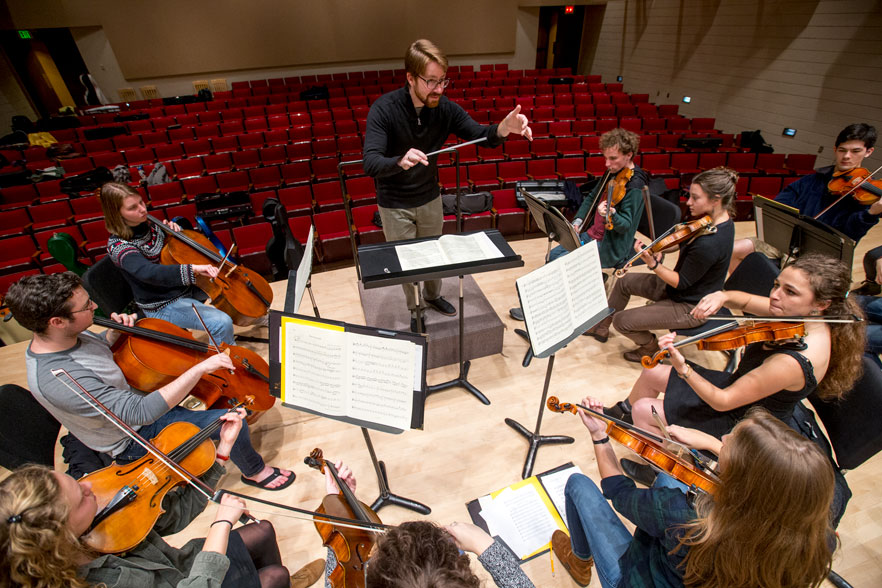Music and History Blend Together for Conductor Paul Luongo
By Tara Roberts

One year, the lead violinist in the Whitman Orchestra might be a music performance major preparing to compete for a place in a major conservatory. The next year, it might be a student majoring in English literature, biology or anthropology.
To orchestra conductor Paul Luongo, it makes no difference what his students study, as long as they love the music - and he appreciates how Whitman's liberal arts model allows this intermingling to happen.
"Once you get into orchestra rehearsal, the rest of the world melts away for an hour and a half," Luongo said. "It's just musicians making music, and it's a pretty cool atmosphere to have these bright, inquisitive students who intersect in that way."
Luongo, an associate professor of music and Paul Garrett Fellow, came to Whitman in 2012. After studying orchestral conducting and musicology at Florida State University, he was looking for a college that would allow him to continue both conducting orchestras and research. Once again, Whitman hit the sweet note.
"At a liberal arts college, I get the opportunity to do both - to pursue two passions that complement and inform each other," he said.
Investing in Students
Luongo loves the multi-semester, multi-year investment he can make in students through the orchestra. He enjoys guiding them as they prepare to perform, starting from the initial rehearsal of a new piece.
"It's this question of how you get these 50 people with different ideas - different backgrounds, different commitment levels because of their schedules, different experiences - to unify their vision and to arrive at this end goal," he said. "That puzzle is scary, but tantalizing."
Then comes the moment a piece comes together, and the performers and their director lose themselves in the music.
"Music is a temporal art. If you think about Beethoven's Fifth Symphony, it never exists at any one moment. It's not like a painting where you hold it up and you say, ‘It's here.' If you're in one moment of a musical work, the prior moment is gone and will never be there again. And the moment about to happen doesn't yet exist," he said. "This makes for an amazing experience when you're really in it, because you're just in that moment of music."
Helping an orchestra of collegiate musicians reach this point is challenging but rewarding. Luongo loves pushing students beyond what they realized they could achieve.
"If you can ignite this passion, they surprise themselves," he said.
Exploring the History of the Musical Canon
Luongo finds different challenges in the classroom, where he is among Whitman's music history faculty members. His goal in these courses is not only to give music majors the historical foundation they need, but also to excite non-majors and help them see how their fields intersect with music.
His research blends his experiences directing orchestras and teaching music history.
He recently concluded a project studying Theodore Thomas, the founding director of the Chicago Symphony. Luongo examined the performance choices Thomas made as the symphony toured the United States in the 19th century, before orchestras were commonplace in much of the country.
Now he's beginning an analysis of major textbooks often used in collegiate music history classrooms and the role they have played in constructing conceptions of the musical canon over the past 50 years.
"I think one of the greatest challenges we're facing as a musicological community is, decades ago, the musical canon was nice, neat, contrived and very narrow. It was also certainly very white and very male," he said. "More recently there's been an effort to broaden this canon and look to composers who might not look like or have the same background as the previous group, creating what are sometimes called counter canons."
The question, then, is how textbook publishers responded to these counter canons. Luongo's early research indicates they decided to include old and new.
"They're then handing the professor massive sweeping texts along with the difficult decision of choosing to artificially chop up the text to try to create a palatable experience; in this way publishers sidestep these difficult decisions," he said.
Luongo's passion for music history often leads him to reflect on the place of his orchestra in history, too. Whitman has a 121-year tradition of orchestral activity.
"When thinking about playing Beethoven's Fifth or Barber's ‘Adagio for Strings,' it's not just my group approaching this music, and it's not just my group approaching this piece that has been played by other orchestras. It's my group approaching this piece that has been played by other Whitman students at other times," he said. "I think it's something that roots our student experience in the long Whitman history."